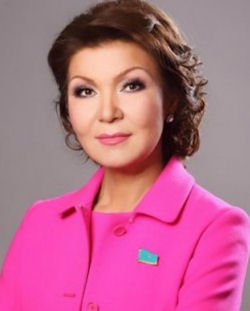Kazakh President Nursultan Nazarbaev dissolved the parliament's lower chamber, the Mazhilis. Nazarbaev's press service said on 20 January 2016 that the president had set the early parliamentary elections for 20 March 2016. The Mazhilis asked Nazarbaev for its early dissolution on January 13, explaining the move as a necessity to tackle new challenges caused by the economic crisis faced by Central Asia's largest economy.
 On 11 September 2015 Nursultan Nazarbayev appointed his daughter Dariga as a deputy prime minister. Prime Minister Karim Masimov was getting quite strong, and thus the president wanted to return the power balance to the family.
On 11 September 2015 Nursultan Nazarbayev appointed his daughter Dariga as a deputy prime minister. Prime Minister Karim Masimov was getting quite strong, and thus the president wanted to return the power balance to the family.
Ms Nazarbayeva was a controversial figure. She is an accomplished opera singer who has performed at Moscow’s Bolshoi Theater. She first entered the public spotlight in 1992 upon being appointed vice president of the Bobek charity foundation, quickly moving on to consolidate her presence in the media. In 2004 Nazarbayeva entered the political sphere when she became chairwoman of the Asar Party and its representative in the Majilis, the lower chamber of Kazakhstan’s parliament. The party existed for only three years, though in 2006 Nazarbayeva went on to become the head of the Kazakhstan First President’s Fund.
In 2007, she and her then husband, Rakhet Aliyev, fell out with her father when their marriage fell apart. Ms Nazarbayeva was forced to quit parliament and relinquished her media interests. Her husband Aliyev fled into exile to be Kazakh ambassador to Austria. He was arrested in Austria in 2014 for the murder of two Kazakh bankers after having his diplomatic immunity lifted. He appeared to have taken his own life in a Vienna prison cell in February 2015, though his Austrian lawyer is convinced he was murdered. She returned to parliament in 2012, was deputy Speaker.
The early parliamentary elections were expected to provide a strong majority for President Nursultan Nazarbaev's ruling party. Over 77 percent of nearly ten million voters cast their ballots on Sunday, setting a new turnout record, the country's Central Election Committee reported. Nazarbaev's Nur Otan party faced no real competition for places in the 107-seat Mazhilis, the lower house of parliament. An exit poll stated that Nur Otan won 82 percent of the vote. Of the six parties on the ballot, three were already in the government and two were loyal to Nazarbayev. The remaining Nationwide Social Democratic Party (NSDP) considered itself to be the opposition.
"It is clear that Kazakhstan still has a long way to go towards fulfilling its election commitments, although some progress was noted. The ruling party had a clear advantage over others in these elections and, while the parties were generally able to campaign freely, genuine political choice remains insufficient," Marietta Tidei, Special Co-ordinator and leader of the short-term OSCE observer mission, said 21 March 2016. "Significant legal reform is required to protect citizens' rights, and we hope that the newly elected parliament will find the political will to engage in a thorough reform process, which we are ready to support."
Contestants were generally able to campaign freely throughout the country, despite legal restrictions on the holding of public assemblies. The participation of six parties provided voters with some alternatives, although most contestants did not directly challenge the ruling party, thus limiting the genuine political choice for voters, the statement says. The dominant position of the ruling party at all levels of government and administration for many years has effectively blurred the distinction between state and party.
As a result of early Mazhilis elections in 2016, the ruling Nur Otan Party won 84 seats, Ak Zhol won seven seats, and the Communist People’s Party of Kazakhstan won seven seats. The ODIHR reported widespread ballot stuffing and inflated vote totals. The ODIHR criticized the election for falling short of the country’s democratic commitments. The legal framework imposed substantial restrictions on fundamental civil and political rights. On election day serious procedural errors and irregularities were noted during voting, counting, and tabulation.
Attention was focused on the president's daughter Darigha Nazarbaeva, who as deputy prime minister was on the Nur Otan party list as a candidate. If she left the government, she could become the speaker of the lower house, which would solidify her position as a potential presidential successor to her 75-year-old father. To some, Nazarbayeva’s appointment was a clear indication that she will serve as Nursultan Nazarbayev’s successor.
According to Kazakh legislation, in the event of the incapacitation of the president, the power and the presidency are passed first to the prime minister, and then from the prime minister to the deputy prime minister. Without Nazarbayev’s legitimacy, the next president might need widespread repression or religious or nationalist ideology to back up their rule.
https://www.globalsecurity.org/military/world/centralasia/kazak-politics-2016.htm